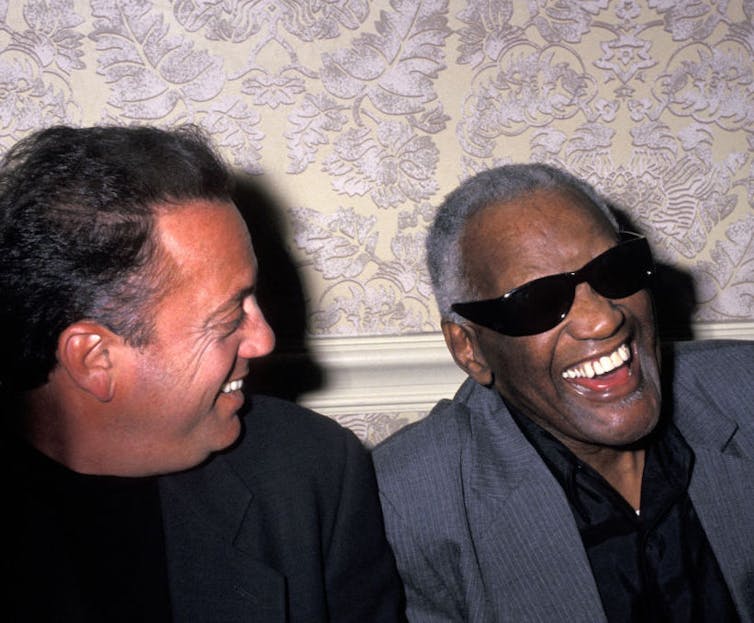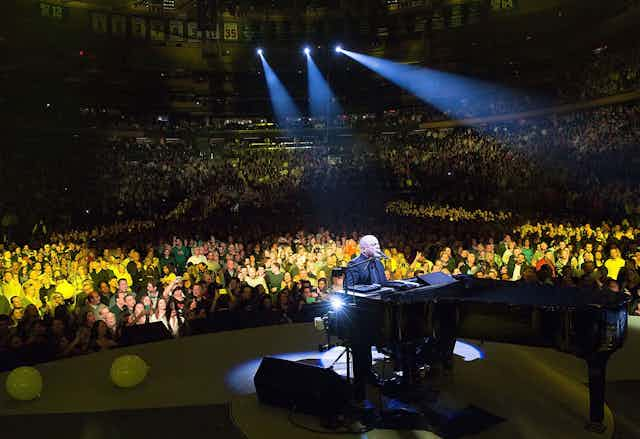With the flip of a digital switch, Billy Joel fans have their first new song in 17 years, “Turn the Lights Back On.”
It has all the markers of a classic Joel ballad: the rhythm and rolling chords of “She’s Always a Woman,” the plea to accept someone “Just the Way You Are,” the percussive bass and snare of “The Downeaster ‘Alexa.’” There’s even a lick in the piano solo some may recall from “Scenes from an Italian Restaurant” – much slower, yes, but we should all be so lucky to be making new music into our 70s.
But what does it all add up to? Does this mean that Billy Joel is back? Did he ever go away?
In my scholarship, I explore the legacy of musicians – how their music reverberates and transforms over time, long after the works themselves came into the world.
What makes Joel such an interesting case study is his active role in shaping the life of music that he composed long ago.
Typically, the legacy of an artist of Joel’s stature comes into view after they pass away. But Joel has been in the “legacy making” phase of his career longer than the entirety of many other musician’s careers.
Creative hibernation
Between 1970 and 1993, Joel released a new album every 12 to 16 months, composing more than 120 songs.
But he hasn’t released a new album of popular music since 1993’s “River of Dreams.” That album concluded with a song titled “Famous Last Words,” a straightforward rock song with a chorus that repeatedly intones, “These are the last words I have to say.”
From a distance, his fans came to understand this as a retirement from churning out hit albums. Since then, Joel – as timeless as some of his songs might be – has largely been an artist locked in time.
Even though he long ago quit recording new music, Joel has continued to fill stadiums. He toured “Face to Face” with Elton John for several years, and in 2014 he began a monthly residency at Madison Square Garden. That run will conclude when he plays his 150th performance in the iconic venue in July 2024.

These continual live performances have both extended the longevity of his songs and have allowed new generations to discover and enjoy his back catalog.
He’s sold more than 150 million albums. Box sets, anthologies and special collector’s editions have long been a way to maintain and capitalize on an artist’s legacy – look no further than the steady line of 50th anniversary reissues released by The Beatles. In the absence of new music, Columbia Records has worked to maintain Joel’s presence by releasing Joel’s “Greatest Hits: Volume III” (1997) and “My Lives” (2005).
A star’s last hurrah?
Now it’s 2024, and Joel has been creatively dormant longer than he was active.
So what’s he doing with “Turn the Lights Back On”? Could a new compilation be in the works?
I’ve written elsewhere about the arrangement of Joel’s life and career through greatest hits compilations.
To encourage the purchase of these compilations, they’re usually accompanied by the release of new material, whether it’s something from the archives that never made it onto one of his prior albums, or – on special occasions – a brand-new song.
But in a streaming era replete with accessible and customizable playlists, promoting a forthcoming album doesn’t seem to be the motivation here.
Rather, Joel seems to be taking a cue from The Beatles.
Last November, they released “Now and Then,” which was marketed as “the last Beatles song.” One month later, Joel wryly suggested during a Madison Square Garden residency concert that he might have something in the pipeline. The news spread via his first-ever post to TikTok.
In some ways, like “Now and Then,” the release of “Turn the Lights Back On” is a once-in-a-lifetime event – particularly for his younger fans.
Indeed, for millions of people this will be the first time many will have ever had the privilege of hearing a new song by an artist they’ve long admired.
In the teaser video announcing this new song on Jan. 22, 2024, you literally see Joel turn the page for this next chapter in his career. If you pay close attention, the page he flips is a waterlogged set of lyrics for “Famous Last Words.”
He’s making good on the promise of the lyrics from that song: “There will be other words some other day, Ain’t that the story of my life?”
Back in the 1990s, he got out of the business of making records because he was in a rut. It’s possible that the years hence haven’t been as fulfilling as he’d hoped.
Does “Turn the Lights Back On” hint at what comes next? Is this Joel ready to share new music with the world again? Or is it a wistful plea from a baby boomer artist to be remembered as his star dims?
Perhaps trying to derive meaning is beside the point. As he declares toward the end of the song, “I’m here right now.”
Maybe that’s all any of his fans can ask for.
This article has been updated to correct the years that have passed since Joel’s last new song. It’s been 17 years, not 15 years.

